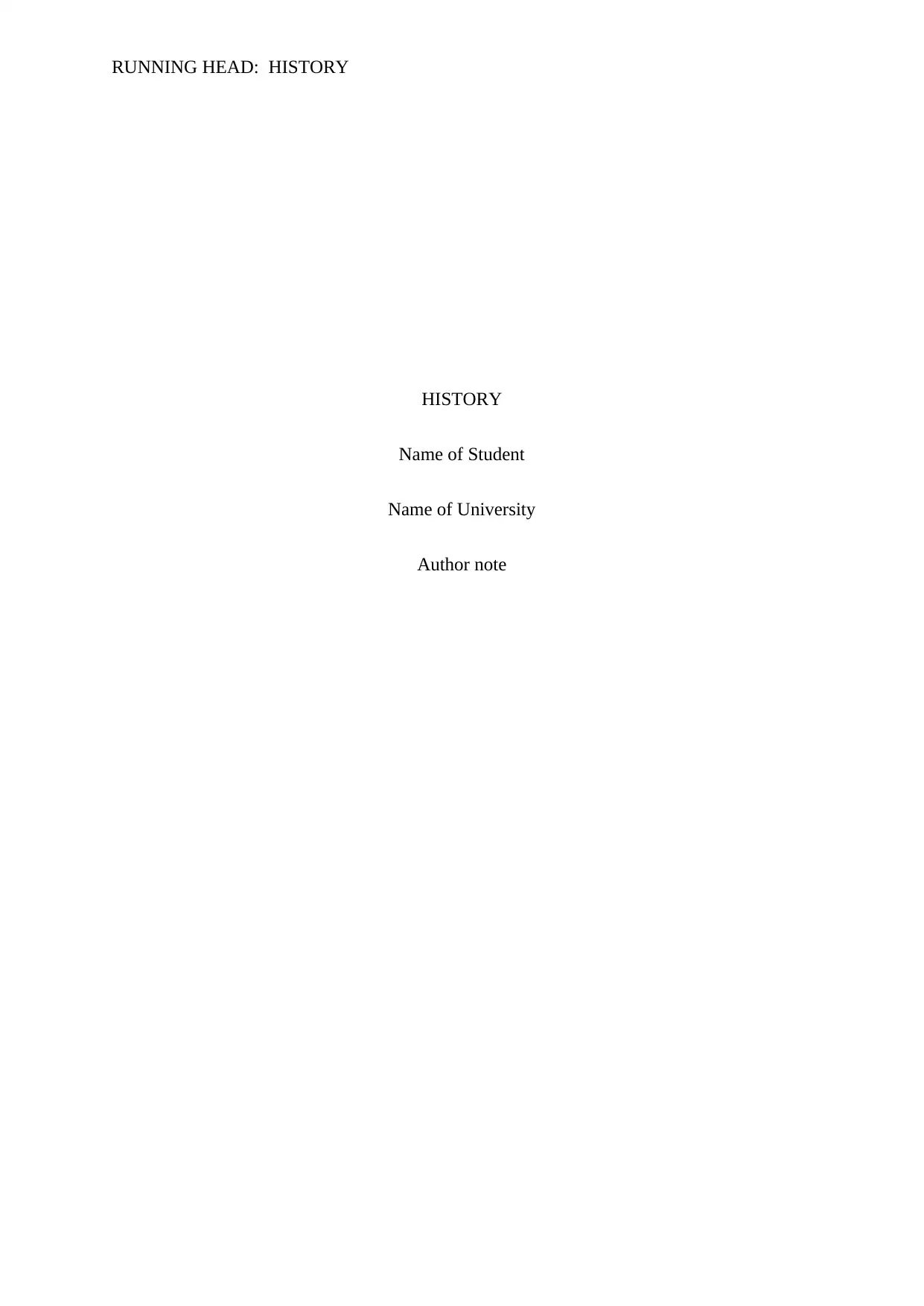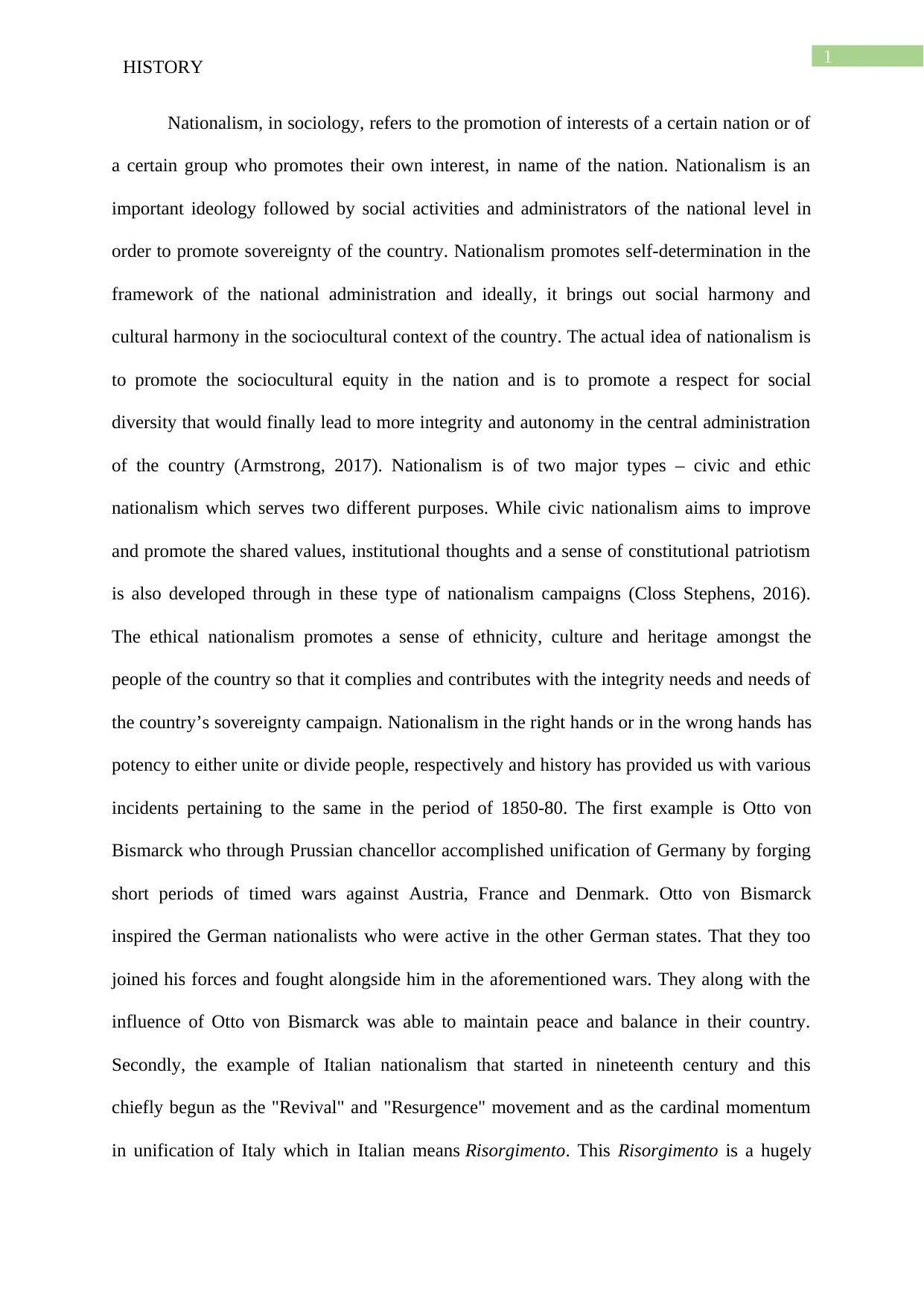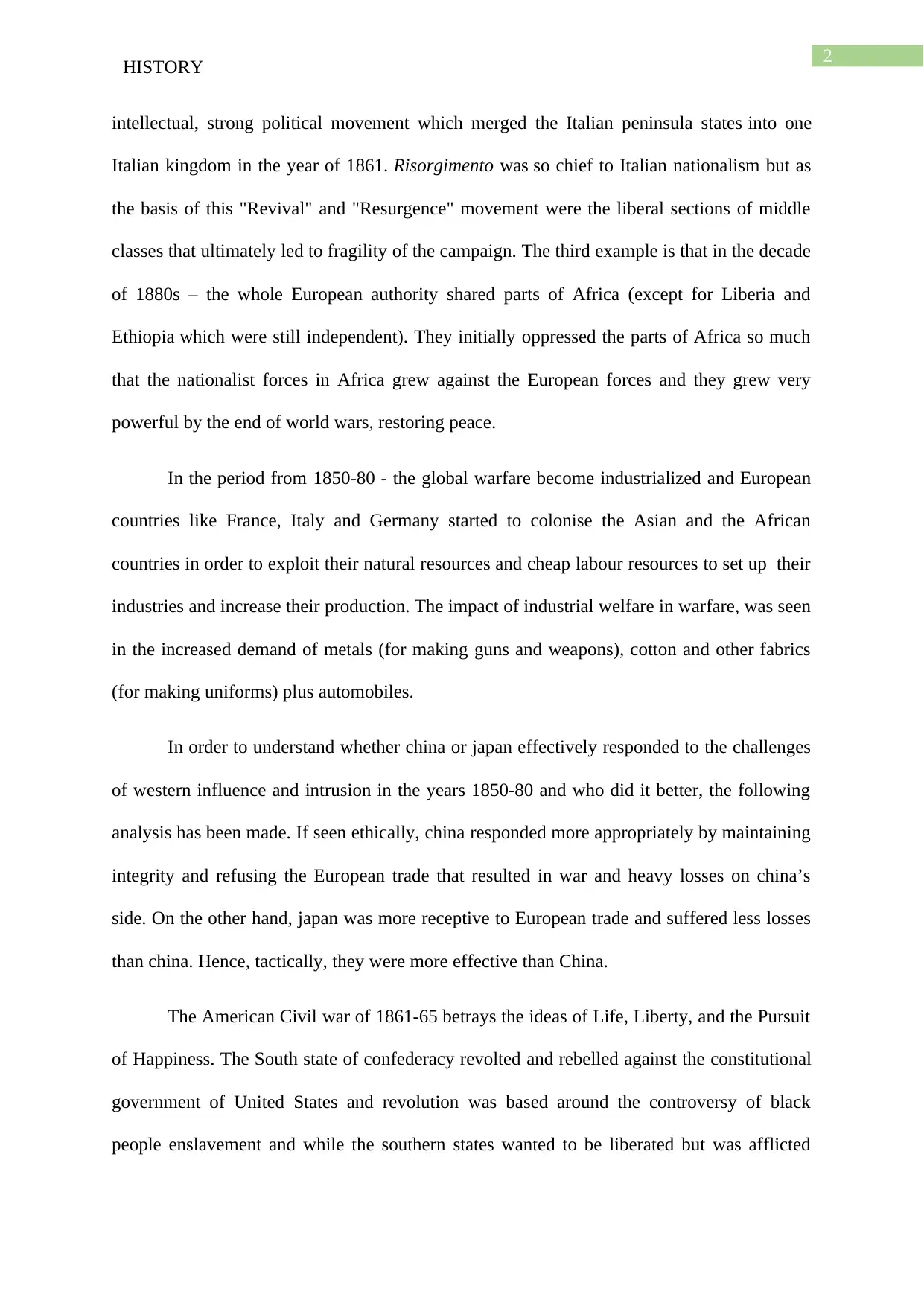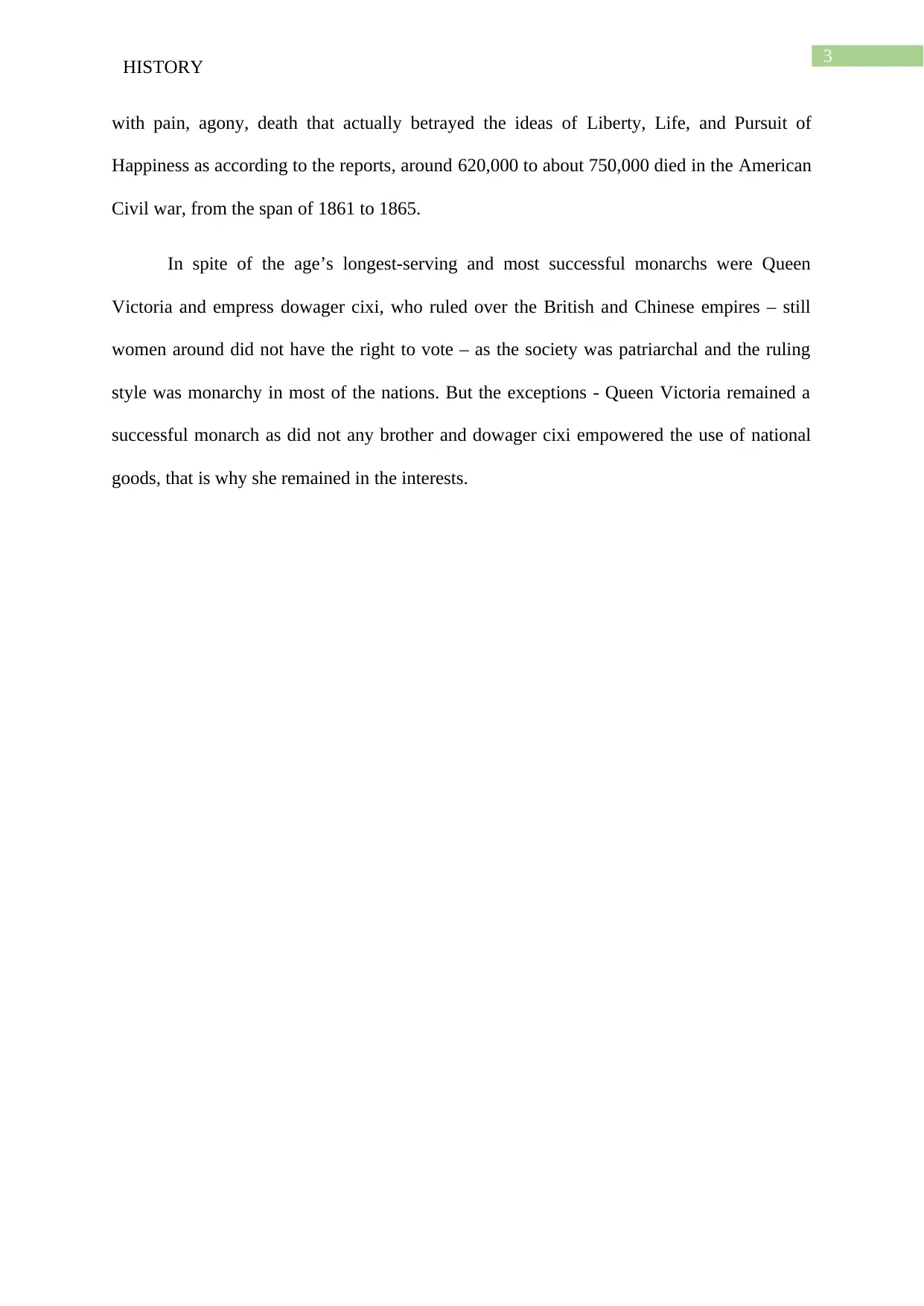History Essay: Nationalism, Warfare, and Women in the 1850-1880s
VerifiedAdded on 2022/09/09
|5
|940
|21
Essay
AI Summary
This essay examines nationalism, its unifying and divisive forces, and provides examples from 1850-80, including Otto von Bismarck's unification of Germany, the Italian Risorgimento, and European colonization of Africa. It also discusses the industrialization of warfare, citing the increased demand for metals, fabrics, and automobiles. The essay analyzes China and Japan's responses to Western influence, concluding that Japan was more tactically effective. The American Civil War's impact on the ideals of Life, Liberty, and the Pursuit of Happiness is also assessed. Finally, the essay contrasts the exclusion of women from voting with the successful reigns of Queen Victoria and Empress Dowager Cixi, offering insights into the global status of women in the late 1800s.

RUNNING HEAD: HISTORY
HISTORY
Name of Student
Name of University
Author note
HISTORY
Name of Student
Name of University
Author note
Paraphrase This Document
Need a fresh take? Get an instant paraphrase of this document with our AI Paraphraser

1
HISTORY
Nationalism, in sociology, refers to the promotion of interests of a certain nation or of
a certain group who promotes their own interest, in name of the nation. Nationalism is an
important ideology followed by social activities and administrators of the national level in
order to promote sovereignty of the country. Nationalism promotes self-determination in the
framework of the national administration and ideally, it brings out social harmony and
cultural harmony in the sociocultural context of the country. The actual idea of nationalism is
to promote the sociocultural equity in the nation and is to promote a respect for social
diversity that would finally lead to more integrity and autonomy in the central administration
of the country (Armstrong, 2017). Nationalism is of two major types – civic and ethic
nationalism which serves two different purposes. While civic nationalism aims to improve
and promote the shared values, institutional thoughts and a sense of constitutional patriotism
is also developed through in these type of nationalism campaigns (Closs Stephens, 2016).
The ethical nationalism promotes a sense of ethnicity, culture and heritage amongst the
people of the country so that it complies and contributes with the integrity needs and needs of
the country’s sovereignty campaign. Nationalism in the right hands or in the wrong hands has
potency to either unite or divide people, respectively and history has provided us with various
incidents pertaining to the same in the period of 1850-80. The first example is Otto von
Bismarck who through Prussian chancellor accomplished unification of Germany by forging
short periods of timed wars against Austria, France and Denmark. Otto von Bismarck
inspired the German nationalists who were active in the other German states. That they too
joined his forces and fought alongside him in the aforementioned wars. They along with the
influence of Otto von Bismarck was able to maintain peace and balance in their country.
Secondly, the example of Italian nationalism that started in nineteenth century and this
chiefly begun as the "Revival" and "Resurgence" movement and as the cardinal momentum
in unification of Italy which in Italian means Risorgimento. This Risorgimento is a hugely
HISTORY
Nationalism, in sociology, refers to the promotion of interests of a certain nation or of
a certain group who promotes their own interest, in name of the nation. Nationalism is an
important ideology followed by social activities and administrators of the national level in
order to promote sovereignty of the country. Nationalism promotes self-determination in the
framework of the national administration and ideally, it brings out social harmony and
cultural harmony in the sociocultural context of the country. The actual idea of nationalism is
to promote the sociocultural equity in the nation and is to promote a respect for social
diversity that would finally lead to more integrity and autonomy in the central administration
of the country (Armstrong, 2017). Nationalism is of two major types – civic and ethic
nationalism which serves two different purposes. While civic nationalism aims to improve
and promote the shared values, institutional thoughts and a sense of constitutional patriotism
is also developed through in these type of nationalism campaigns (Closs Stephens, 2016).
The ethical nationalism promotes a sense of ethnicity, culture and heritage amongst the
people of the country so that it complies and contributes with the integrity needs and needs of
the country’s sovereignty campaign. Nationalism in the right hands or in the wrong hands has
potency to either unite or divide people, respectively and history has provided us with various
incidents pertaining to the same in the period of 1850-80. The first example is Otto von
Bismarck who through Prussian chancellor accomplished unification of Germany by forging
short periods of timed wars against Austria, France and Denmark. Otto von Bismarck
inspired the German nationalists who were active in the other German states. That they too
joined his forces and fought alongside him in the aforementioned wars. They along with the
influence of Otto von Bismarck was able to maintain peace and balance in their country.
Secondly, the example of Italian nationalism that started in nineteenth century and this
chiefly begun as the "Revival" and "Resurgence" movement and as the cardinal momentum
in unification of Italy which in Italian means Risorgimento. This Risorgimento is a hugely

2
HISTORY
intellectual, strong political movement which merged the Italian peninsula states into one
Italian kingdom in the year of 1861. Risorgimento was so chief to Italian nationalism but as
the basis of this "Revival" and "Resurgence" movement were the liberal sections of middle
classes that ultimately led to fragility of the campaign. The third example is that in the decade
of 1880s – the whole European authority shared parts of Africa (except for Liberia and
Ethiopia which were still independent). They initially oppressed the parts of Africa so much
that the nationalist forces in Africa grew against the European forces and they grew very
powerful by the end of world wars, restoring peace.
In the period from 1850-80 - the global warfare become industrialized and European
countries like France, Italy and Germany started to colonise the Asian and the African
countries in order to exploit their natural resources and cheap labour resources to set up their
industries and increase their production. The impact of industrial welfare in warfare, was seen
in the increased demand of metals (for making guns and weapons), cotton and other fabrics
(for making uniforms) plus automobiles.
In order to understand whether china or japan effectively responded to the challenges
of western influence and intrusion in the years 1850-80 and who did it better, the following
analysis has been made. If seen ethically, china responded more appropriately by maintaining
integrity and refusing the European trade that resulted in war and heavy losses on china’s
side. On the other hand, japan was more receptive to European trade and suffered less losses
than china. Hence, tactically, they were more effective than China.
The American Civil war of 1861-65 betrays the ideas of Life, Liberty, and the Pursuit
of Happiness. The South state of confederacy revolted and rebelled against the constitutional
government of United States and revolution was based around the controversy of black
people enslavement and while the southern states wanted to be liberated but was afflicted
HISTORY
intellectual, strong political movement which merged the Italian peninsula states into one
Italian kingdom in the year of 1861. Risorgimento was so chief to Italian nationalism but as
the basis of this "Revival" and "Resurgence" movement were the liberal sections of middle
classes that ultimately led to fragility of the campaign. The third example is that in the decade
of 1880s – the whole European authority shared parts of Africa (except for Liberia and
Ethiopia which were still independent). They initially oppressed the parts of Africa so much
that the nationalist forces in Africa grew against the European forces and they grew very
powerful by the end of world wars, restoring peace.
In the period from 1850-80 - the global warfare become industrialized and European
countries like France, Italy and Germany started to colonise the Asian and the African
countries in order to exploit their natural resources and cheap labour resources to set up their
industries and increase their production. The impact of industrial welfare in warfare, was seen
in the increased demand of metals (for making guns and weapons), cotton and other fabrics
(for making uniforms) plus automobiles.
In order to understand whether china or japan effectively responded to the challenges
of western influence and intrusion in the years 1850-80 and who did it better, the following
analysis has been made. If seen ethically, china responded more appropriately by maintaining
integrity and refusing the European trade that resulted in war and heavy losses on china’s
side. On the other hand, japan was more receptive to European trade and suffered less losses
than china. Hence, tactically, they were more effective than China.
The American Civil war of 1861-65 betrays the ideas of Life, Liberty, and the Pursuit
of Happiness. The South state of confederacy revolted and rebelled against the constitutional
government of United States and revolution was based around the controversy of black
people enslavement and while the southern states wanted to be liberated but was afflicted
⊘ This is a preview!⊘
Do you want full access?
Subscribe today to unlock all pages.

Trusted by 1+ million students worldwide

3
HISTORY
with pain, agony, death that actually betrayed the ideas of Liberty, Life, and Pursuit of
Happiness as according to the reports, around 620,000 to about 750,000 died in the American
Civil war, from the span of 1861 to 1865.
In spite of the age’s longest-serving and most successful monarchs were Queen
Victoria and empress dowager cixi, who ruled over the British and Chinese empires – still
women around did not have the right to vote – as the society was patriarchal and the ruling
style was monarchy in most of the nations. But the exceptions - Queen Victoria remained a
successful monarch as did not any brother and dowager cixi empowered the use of national
goods, that is why she remained in the interests.
HISTORY
with pain, agony, death that actually betrayed the ideas of Liberty, Life, and Pursuit of
Happiness as according to the reports, around 620,000 to about 750,000 died in the American
Civil war, from the span of 1861 to 1865.
In spite of the age’s longest-serving and most successful monarchs were Queen
Victoria and empress dowager cixi, who ruled over the British and Chinese empires – still
women around did not have the right to vote – as the society was patriarchal and the ruling
style was monarchy in most of the nations. But the exceptions - Queen Victoria remained a
successful monarch as did not any brother and dowager cixi empowered the use of national
goods, that is why she remained in the interests.
Paraphrase This Document
Need a fresh take? Get an instant paraphrase of this document with our AI Paraphraser

4
HISTORY
References
Armstrong, J.A., 2017. Nations before nationalism. UNC Press Books.
Closs Stephens, A., 2016. The affective atmospheres of nationalism. Cultural
Geographies, 23(2), pp.181-198.
HISTORY
References
Armstrong, J.A., 2017. Nations before nationalism. UNC Press Books.
Closs Stephens, A., 2016. The affective atmospheres of nationalism. Cultural
Geographies, 23(2), pp.181-198.
1 out of 5
Your All-in-One AI-Powered Toolkit for Academic Success.
+13062052269
info@desklib.com
Available 24*7 on WhatsApp / Email
![[object Object]](/_next/static/media/star-bottom.7253800d.svg)
Unlock your academic potential
Copyright © 2020–2026 A2Z Services. All Rights Reserved. Developed and managed by ZUCOL.